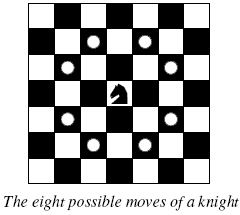A Knight's Journey
| Time Limit: 1000MS | Memory Limit: 65536K | |
| Total Submissions: 23951 | Accepted: 8094 |
Description
 Background
Background
The knight is getting bored of seeing the same black and white squares again and again and has decided to make a journey
around the world. Whenever a knight moves, it is two squares in one direction and one square perpendicular to this. The world of a knight is the chessboard he is living on. Our knight lives on a chessboard that has a smaller area than a regular 8 * 8 board, but it is still rectangular. Can you help this adventurous knight to make travel plans?
Problem
Find a path such that the knight visits every square once. The knight can start and end on any square of the board.
Input
The input begins with a positive integer n in the first line. The following lines contain n test cases. Each test case consists of a single line with two positive integers p and q, such that 1 <= p * q <= 26. This represents a p * q chessboard, where p describes how many different square numbers 1, . . . , p exist, q describes how many different square letters exist. These are the first q letters of the Latin alphabet: A, . . .
Output
The output for every scenario begins with a line containing "Scenario #i:", where i is the number of the scenario starting at 1. Then print a single line containing the lexicographically first path that visits all squares of the chessboard with knight moves followed by an empty line. The path should be given on a single line by concatenating the names of the visited squares. Each square name consists of a capital letter followed by a number.
If no such path exist, you should output impossible on a single line.
If no such path exist, you should output impossible on a single line.
Sample Input
3 1 1 2 3 4 3
Sample Output
Scenario #1: A1 Scenario #2: impossible Scenario #3: A1B3C1A2B4C2A3B1C3A4B2C4
Source
TUD Programming Contest 2005, Darmstadt, Germany
以字典序输出排序,则搜索方向就要按照特定的顺序排序,则第一个遍历的路径一定是字典序。DFS问题。很好。
#include<stdio.h>
#include<string.h>
int m,n,tot, flag;
int dir[8][2] {{-2,-1},{-2,1},{-1,-2},{-1,2},{1,-2},{1,2},{2,-1},{2,1}};
int mark[27][27],stack[100][2];
void print()
{
for(int b=1;b<=tot;b++)
printf("%c%d",stack[b][0]+64,stack[b][1]);
printf("\n");
}
void dfs(int num)
{
int xx,yy,i,x,y,numn;
if(num==tot&&!flag)
{
print();
flag=1;
return;
}
x=stack[num][0];
y=stack[num][1];
for(i=0; i<8; i++)
if(!flag)
{
xx=x+dir[i][0];
yy=y+dir[i][1];
if((xx>0)&&(xx<=n)&&(yy>0)&&(yy<=m)&&mark[xx][yy]==0)
{
numn=num+1;
stack[numn][0]=xx;
stack[numn][1]=yy;
mark[xx][yy]=1;
dfs(numn);
mark[xx][yy]=0;
}
}
else return;
}
int main()
{
int t,a;
scanf("%d",&t);
for(a=1; a<=t; a++)
{
scanf("%d%d",&m,&n);
memset(mark,0,sizeof(mark));
memset(stack,0,sizeof(stack));
flag=0;
tot=n*m;
mark[1][1]=1;
stack[1][0]=1;
stack[1][1]=1;
printf("Scenario #%d:\n",a);
dfs(1);
if(!flag)printf("impossible\n");
printf("\n");
}
return 0;
}





















 1663
1663

 被折叠的 条评论
为什么被折叠?
被折叠的 条评论
为什么被折叠?








